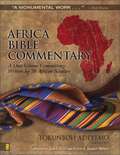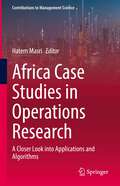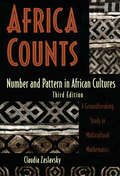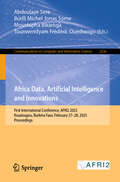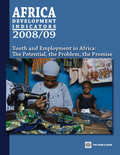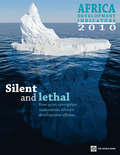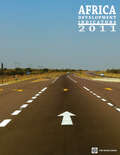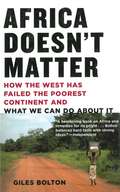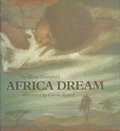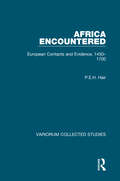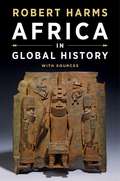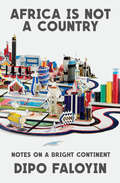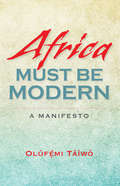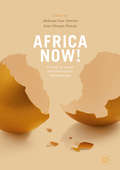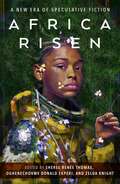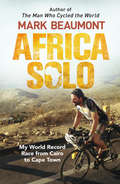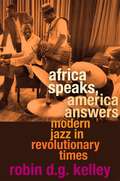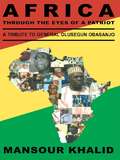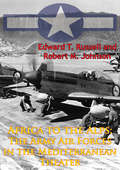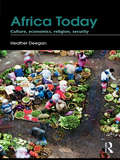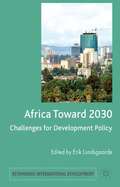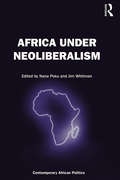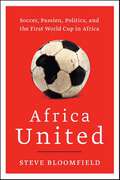- Table View
- List View
Africa Bible Commentary: A One-Volume Commentary Written by 70 African Scholars
by ZondervanThe Africa Bible Commentary is a unique publishing event—the first one-volume Bible commentary produced in Africa by African theologians to meet the needs of African pastors, students, and lay leaders. Interpreting and applying the Bible in the light of African culture and realities, it furnishes powerful and relevant insights into the biblical text that transcend Africa in their significance. The Africa Bible Commentary gives a section-by-section interpretation that provides a contextual, readable, affordable, and immensely useful guide to the entire Bible. Readers around the world will benefit from and appreciate the commentary’s fresh insights and direct style that engage both heart and mind. Key features: · Produced by African biblical scholars, in Africa, for Africa—and for the world · Section-by-section interpretive commentary and application · More than 70 special articles dealing with topics of key importance in to ministry in Africa today, but that have global implications · 70 African contributors from both English- and French-speaking countries · Transcends the African context with insights into the biblical text and the Christian faith for readers worldwide
Africa Case Studies in Operations Research: A Closer Look into Applications and Algorithms (Contributions to Management Science)
by Hatem MasriThis book presents contributions to the 50th Annual Conference of the Operations Research Society of South Africa (ORSSA), which was jointly hosted with the African Federation of Operations Research Societies (AFROS) at North-West University in Potchefstroom, South Africa from 12 to 15 September, 2021. Focusing on innovative case studies and recent applications of Operations Research models and algorithms in African countries, each chapter highlights findings emerging from the countries in question and explains the lessons learned. As such, the book offers an up-to-date overview of Operations Research practices and developments in Africa. AFROS is a “not for profit” organization that aims to promote Operations Research in Africa. Its affairs are regulated by an Executive Committee consisting of representatives/alternates of all its member societies. The members of the Federation undertake to co-operate in the advancement of knowledge, interest and education in Operations Research by appropriate means, particularly the exchange of information, the holding of meetings and conferences, and the awarding of prizes.
Africa Counts: Number and Pattern in African Cultures
by Claudia ZaslavskyThis fascinating study of mathematical thinking among sub-Saharan African peoples covers counting in words and in gestures; measuring time, distance, weight, and other quantities; manipulating money and keeping accounts; number systems; patterns in music, poetry, art, and architecture; and number magic and taboos. African games such as mankala and elaborate versions of tic-tac-toe show how complex this thinking can be. An invaluable resource for students, teachers, and others interested in African cultures and multiculturalism, this third edition is updated with an introduction covering two decades of new research in the ethnomathematics of Africa.
Africa Data, Artificial Intelligence and Innovations: First International Conference, AFRI2 2025, Koudougou, Burkina Faso, February 27–28, 2025, Proceedings (Communications in Computer and Information Science #2536)
by Abdoulaye Sere Borlli Michel Jonas Some Moustapha Bikienga Tounwendyam Frédéric OuedraogoThis volume constitutes the proceedings of 1st International Conference on Africa Data, Artificial Intelligence and Innovations, AFRI2 2025, in Koudougou, Burkina Faso, during February 27–28, 2025. The 14 full papers were presented in this volume were carefully reviewed and selected from 50 submissions. They focus on Artificial intelligence Application: Large language models (LLMs) ; Data Protection, Cybersecurity and system; Data analytic and Decision Making.
Africa Development Indicators 2008/09
by World BankAfrica Development Indicators 2008/09 (ADI) provides the most detailed collection of data on Africa available in one volume. It puts together data from different sources, making it an essential tool for policy makers, researchers, and other people interested in Africa. This year's ADI addresses the issue of youth employment. The report shows that success in addressing youth employment in will not be achieved and sustained through fragmented and isolated interventions. Instead it finds that an arching guideline for addressing the youth employment challenge is the need for an integrated strategy for rural development, growth and job creation - which covers the demand and the supply sides of the labor market and takes into account the youth mobility from rural to urban areas - combined with targeted interventions to help young people overcome disadvantages in entering and remaining in the labor market. This edition includes the Africa Development Indicators 2008/09 Single User CD-ROM and opening articles from leading economists reporting and analyzing key African economic and development issues.
Africa Development Indicators 2010
by World BankReliable quantitative data are essential for understanding economic, social and governance development because it provides evidence, and evidence are crucial to set policies, monitor progress and evaluate results. 'Africa Development Indicators 2010' (ADI) provides the most detailed collection of data on Africa available. It puts together data from different sources, and is an essential tool for policy makers, researchers, and other people interested in Africa. The opening articles of the 'ADI 2010' print edition focus on behaviors that are difficult to observe and quantify, but whose impact on service delivery and regulation has adverse long-term effects on households. The term 'quiet corruption' is introduced to indicate various types of malpractice of frontline providers (teachers, doctors, and other government officials at the front lines of service provision) that do not involve monetary exchange. The prevalence of quiet corruption and its long-term consequences might be even more harmful for developing countries, and for the poor in particular who are more exposed to adverse shocks to their income and are more reliant on government services to satisfy their most basic needs.
Africa Development Indicators 2011
by the editors at The World BankReliable quantitative data are essential for understanding economic, social and governance development because it provides evidence, and evidence are crucial to set policies, monitor progress and evaluate results. Africa Development Indicators 2010 (ADI) provides the most detailed collection of data on Africa available. It puts together data from different sources, and is an essential tool for policy makers, researchers, and other people interested in Africa.
Africa Doesn't Matter: How the West Has Failed the Poorest Continent and What We Can Do About It
by Giles BoltonWhat happens to the billions of aid dollars given yearly? Why do trade rules that fail African countries also cost us at the checkout line? Why don't the African people matter? In this engaging, jargon-free, reader-friendly guide, longtime aid worker and diplomat Giles Bolton offers his radical analysis of the problems Africa faces, drawing on years of first-hand experience on the ground. Bolton illustrates how the needs of African states exceed their budgets, leaving a gap for aid to fill; how the way Western aid is delivered renders it largely ineffective; and how trade rules and globalization have worked against African development.
Africa Dream
by Eloise Greenfield Carole ByardAn African-American child dreams of long-ago Africa, where she sees animals, shops in a marketplace, reads strange words from an old book, and returns to the village where her long-ago granddaddy welcomes her. Greenfield's lyrical telling and Byard's marvelous pictures make this book close to an ideal adventure for children, black or white. ' -Publishers Weekly. <P><P> 1978 Coretta Scott King Award
Africa Encountered: European Contacts and Evidence, 1450-1700 (Variorum Collected Studies)
by P.E.H. HairProfessor Hair’s aim here has been to explore the European written record for the history of Africa south of the Sahara. This effectively began with the arrival of the Portuguese on the Guinea coast and many of these articles focus on Sierra Leone; others extend the enquiry to southern Africa. One particular theme is the use of early vocabularies of African languages as a source for the history of local populations. At the same time, these studies help illuminate the European reaction to the peoples and the places they encountered.
Africa In Global History With Sources
by Robert HarmsAward-winning historian Robert Harms offers a contemporary history of Africa--one that reflects the continent's cultural richness and diversity while presenting its history in a global context. A chronological narrative covers the origins of humankind to the present, focusing on similarities and differences across regions and the continent as a whole. A stunning full-color design engages the reader with primary sources, images, and maps, and instructor resources enhance the teaching experience.
Africa In World Politics: Post-Cold War Challenges
by Donald Rothchild John HarbesonAfrican states have been on the periphery of world politics since independence, and they will likely continue to be marginalized as Cold War tensions disappear and economic and political ties to the industrialized world weaken. This book explores Africa’s changing position, addressing the region’s colonial heritage as well as the historical, economic, and cultural factors that have shaped the continent’s standing in world affairs. The contributors also analyze some of the most intense conflicts and examine the evolution of relations with other regions and powers.The second edition of Africa in World Politics has been fully revised and updated to explore trends in the region and the world. The focus on Russia’s role in contemporary Africa has been significantly reduced, and francophone Africa and regional organizations have been given increased coverage. In addition, important new issues such as democratization, conflict resolution, territorial concerns, and humanitarian intervention are covered in depth. The result is a thought-provoking and up-to-date text written by leading scholars in their fields.
Africa Is Not a Country: Notes On A Bright Continent
by Dipo FaloyinA Literary Hub Most Anticipated Book of 2022 An exuberant, opinionated, stereotype-busting portrait of contemporary Africa in all its splendid diversity, by one of its leading new writers. So often, Africa has been depicted simplistically as a uniform land of famines and safaris, poverty and strife, stripped of all nuance. In this bold and insightful book, Dipo Faloyin offers a much-needed corrective, weaving a vibrant tapestry of stories that bring to life Africa’s rich diversity, communities, and histories. Starting with an immersive description of the lively and complex urban life of Lagos, Faloyin unearths surprising truths about many African countries’ colonial heritage and tells the story of the continent’s struggles with democracy through seven dictatorships. With biting wit, he takes on the phenomenon of the white savior complex and brings to light the damage caused by charity campaigns of the past decades, revisiting such cultural touchstones as the KONY 2012 film. Entering into the rivalries that energize the continent, Faloyin engages in the heated debate over which West African country makes the best jollof rice and describes the strange, incongruent beauty of the African Cup of Nations. With an eye toward the future promise of the continent, he explores the youth-led cultural and political movements that are defining and reimagining Africa on their own terms. The stories Faloyin shares are by turns joyful and enraging; proud and optimistic for the future even while they unequivocally confront the obstacles systematically set in place by former colonial powers. Brimming with humor and wit, filled with political insights, and, above all, infused with a deep love for the region, Africa Is Not a Country celebrates the energy and particularity of the continent’s different cultures and communities, treating Africa with the respect it deserves.
Africa Must Be Modern
by Olúfemi TáíwòIn a forthright and uncompromising manner, Olúfémi Táíwò explores Africa's hostility toward modernity and how that hostility has impeded economic development and social and political transformation. What has to change for Africa to be able to respond to the challenges of modernity and globalization? Táíwò insists that Africa can renew itself only by fully engaging with democracy and capitalism and by mining its untapped intellectual resources. While many may not agree with Táíwò's positions, they will be unable to ignore what he says. This is a bold exhortation for Africa to come into the 21st century.
Africa Now!: Emerging Issues and Alternative Perspectives
by Adebusuyi Adeniran Lanre IkuteyijoThis book presents relevant and timely endogenous procedures for addressing the challenge of transforming ideas into sustainable opportunities in Africa. It explores how Africa could be understood in the context of emerging global realities, providing alternative frameworks that will not just be participatory in conception and practice, but equally show a contextual workability for the varying aspects of the developmental enterprise in Africa. Despite having alternative and less cumbersome sources of funding, with commendable economic growth indices, and several economies among the fastest growing globally, African countries have been unable to transmute related opportunities into sustainable human development outcomes for majority of its citizenry. Over four rich sections the authors cover subjects ranging from environment and natural resource management, to governance, economy and sustainable development. The book continues with a section on Education and Human Development and a case study in transnationalism. The final section discusses crime, conflict and regional dynamics, including highly disputed topics such as forced migration and sex trade. This indispensable resource will be of great use to students and researches globally in fields such as sociology, anthropology, environmental studies, politics and economics with a focus on contemporary Africa, as well as to policy planners and human rights activists invested in the future development of Africa.
Africa Risen: A New Era of Speculative Fiction
by Sheree Renée Thomas Oghenechovwe Donald Ekpeki Zelda KnightWinner of the 2023 World Fantasy Award for Best AnthologyWinner of the 2023 Locus Award for Best AnthologyA 2023 NAACP Image Award NomineeA 2023 British Fantasy Award NomineeA NPR Best of the Year pickA Book Riot Best SFF of the Year pick"[A] magnificent and wide-ranging anthology . . . A must-read for all genre fans."—Publishers Weekly, starred reviewFrom award-winning editorial team Sheree Renée Thomas, Oghenechovwe Donald Ekpeki, and Zelda Knight comes an anthology of thirty-two original stories showcasing the breadth of fantasy and science fiction from Africa and the African Diaspora.A group of cabinet ministers query a supercomputer containing the minds of the country’s ancestors. A child robot on a dying planet uncovers signs of fragile new life. A descendent of a rain goddess inherits her grandmother’s ability to change her appearance—and perhaps the world.Created in the legacy of the seminal, award-winning anthology series Dark Matter, Africa Risen celebrates the vibrancy, diversity, and reach of African and Afro-Diasporic SFF and reaffirms that Africa is not rising—it’s already here.At the Publisher's request, this title is being sold without Digital Rights Management Software (DRM) applied.
Africa Since 1940
by Frederick CooperFrederick Cooper's latest book on the history of decolonization and independence in Africa helps students understand the historical process from which Africa's current position in the world has emerged. Bridging the divide between colonial and post-colonial history, it shows what political independence did and did not signify and how men and women, peasants and workers, religious leaders and local leaders sought to refashion the way they lived, worked, and interacted with each other.
Africa Solo: My World Record Race from Cairo to Cape Town
by Mark BeaumontSHORTLISTED FOR ADVENTURE TRAVEL BOOK OF THE YEARIn the spring of 2015, Mark Beaumont set out from the bustling heart of Cairo on his latest world record attempt - solo, the length of Africa, intending to ride to Cape Town in under 50 days. Seven years since he smashed the world record for cycling round the world, this would be his toughest trip yet. And he would set a new mark that would simply break the limits of endurance.Despite illness, mechanical faults, attempted robbery and stone-throwing children, as well as dehydration in the deserts and unprecedented levels of exhaustion, Mark completed the journey in just 41 days, 10 hours and 22 minutes, after cycling 6,762 miles, spending 439 hours in the saddle (sometimes up to 16 hours a day) and climbing 190,355 feet through 8 countries. It was an astonishing journey, and one that will fascinate and grip the reader.From the obvious dangers of Egypt, Sudan and Kenya, over the unpaved, muddy, mountainous roads of Ethiopia, through the beautiful grasslands of Tanzania and Zambia, to riding at night in Botswana in the company of elephants and giraffes, Mark brings Africa to life in all its complex glory, friendship and curiosity, while inspiring us all to question the bounds of what is possible.
Africa Speaks, America Answers
by Robin D. G. KelleyIn Bedford-Stuyvesant, Brooklyn, pianist Randy Weston and bassist Ahmed Abdul-Malik celebrated with song the revolutions spreading across Africa. In Ghana and South Africa, drummer Guy Warren and vocalist Sathima Bea Benjamin fused local musical forms with the dizzying innovations of modern jazz. These four were among hundreds of musicians in the 1950s and ’60s who forged connections between jazz and Africa that definitively reshaped both their music and the world. Each artist identified in particular ways with Africa’s struggle for liberation and made music dedicated to, or inspired by, demands for independence and self-determination. That music was the wild, boundary-breaking exultation of modern jazz. The result was an abundance of conversation, collaboration, and tension between African and African American musicians during the era of decolonization. This collective biography demonstrates how modern Africa reshaped jazz, how modern jazz helped form a new African identity, and how musical convergences and crossings altered politics and culture on both continents. In a crucial moment when freedom electrified the African diaspora, these black artists sought one another out to create new modes of expression. Documenting individuals and places, from Lagos to Chicago, from New York to Cape Town, Robin Kelley gives us a meditation on modernity: we see innovation not as an imposition from the West but rather as indigenous, multilingual, and messy, the result of innumerable exchanges across a breadth of cultures.
Africa Through The Eyes Of A Pat
by KhalidGeneral Olusegun Obasanjo was recently elected president in the first Nigerian free and popular elections held after fifteen years of military rule. Having voluntarily given over his power to civilians in 1979, Obasanjo has since dedicated himself to Pan-Africanism, conflict resolution in Africa, and regional and international cooperation. "Africa Through the Eyes of a Patriot" is a collection of his most memorable speeches from the 1980s to the present, touching on issues as varies as democracy and policy-making to human rights and the environment.
Africa To The Alps: The Army Air Forces In The Mediterranean Theater [Illustrated Edition]
by Edward T. RussellIncludes over 14 photos and mapsBy the time the U.S. declared war on Germany and Italy on December 11, 1941, most of Europe had fallen under the domination of Adolf Hitler, dictator of Germany's Third Reich. In the west, only Great Britain, her armies expelled from the European continent, remained defiant; in the east, Hitler faced an implacable foe-the Soviet Union. While the Soviets tried to stave off a relentless German attack that had reached Moscow, Britain and her Commonwealth allies fought a series of crucial battles with Axis forces in North Africa.Initially, America's entry into the war changed nothing. The U.S. continued to supply the Allies with the tools of war, as it had since the passage of the Lend-Lease Act in March 1941. U.S. military forces, however, had to be expanded, trained, equipped, and deployed, all of which would take time.With the U.S. in the war, the Allies faced the question of where American forces could best be used. President Franklin D. Roosevelt and British Prime Minister Winston S. Churchill had already agreed that defeating first Germany and then Japan would be their policy, but that decision raised further questions.Roosevelt wanted U.S. troops in combat against German troops as soon as possible. Josef Stalin, the Soviet leader, demanded a second front in northern Europe to relieve pressure on his armed forces. Churchill, fearing German power in France, hoped for a strike at the Mediterranean periphery of Hitler's conquests-what he called the "soft underbelly" of Europe.Churchill proposed an invasion of northwest Africa for late 1942 and Roosevelt agreed...Africa to the Alps describes the participation of the Army Air Forces in the war in the Mediterranean theater of operations, as it developed a practical air-ground doctrine, established an effective interdiction strategy, and gained valuable experience in airborne operations and close air support of ground troops.
Africa Today: Culture, Economics, Religion, Security
by Heather DeeganIn the post 9/11 global environment Africa is standing at a crossroads in international affairs as the combined issues of politics, religion and security attract renewed interest. While some countries seem to be moving forward with greater levels of confidence, democracy and stability, others continue to be mired in conflict, poverty and religious/ethnic division. This text focuses on key contemporary issues that the continent faces, providing a comprehensive introduction of current political, religious, developmental and security concerns. Features include: Individual chapters devoted to key issues including health, gender, corruption, religion and the newly emerging problems of human security. Case studies and detailed analysis of topical issues, including: Muslim/Christian clashes: Kano, Northern Nigeria Conflict, Arms and Reconstruction: Darfur and Sierra Leone Comprehensive range of countries discussed including: Zimbabwe, Botswana, Kenya Ethiopia, Uganda, Lesotho, Somalia, Namibia and Madagascar. Fully up-to-date statistics including primary research based on interviews conducted by the author, providing data for both individual countries and the continent as a whole. Boxed descriptions explaining clearly the ideas in important subject areas, such as Islamic law and society By drawing on the author’s empirical research and situating discussion within the context of wider debate, Africa Today is designed both to introduce and to develop a deeper understanding of this rapidly changing continent an essential text for all students of African politics and International Relations.
Africa Toward 2030
by Erik LundsgaardeWith the deadline of the Millennium Development Goals approaching, governments are considering the main elements for a global development policy reference system after 2015. Adapting insights from the scenario analysis tradition, the contributors identify six major underlying causes of change and key uncertainties affecting Africa's development prospects. The drivers of change considered vital in shaping Africa's future include demography, climate change, technology and innovation, domestic political development, new actors in international development, and global governance. The book outlines several generalized scenarios for the continent's future and discusses the implications of the changing African development context for the priorities and organization of European development cooperation.
Africa Under Neoliberalism: A Century Of Struggle And Quest For Legitimacy (Contemporary African Politics)
by Nana Poku Jim WhitmanThe period since the 1980s has seen sustained pressure on Africa’s political elite to anchor the continent’s development strategies in neoliberalism in exchange for vitally needed development assistance. Rafts of policies and programmes have come to underpin the relationship between continental governments and the donor communities of the West and particularly their institutions of global governance – the International Financial Institutions. Over time, these policies and programmes have sought to transform the authority and capacity of the state to effect social, political and economic change, while opening up the domestic space for transnational capital and ideas. The outcome is a continent now more open to international capital, export-oriented and liberal in its political governance. Has neoliberalism finally arrested under development in Africa? Bringing together leading researchers and analysts to examine key questions from a multidisciplinary perspective, this book involves a fundamental departure from orthodox analysis which often predicates colonialism as the referent object. Here, three decades of neoliberalism with its complex social and economic philosophy are given primacy. With the changed focus, an elucidation of the relationship between global development and local changes is examined through a myriad of pressing contemporary issues to offer a critical multi-disciplinary appraisal of challenge and change in Africa over the past three decades.
Africa United: Soccer, Passion, Politics, and the First World Cup in Africa
by Steve BloomfieldAfrica United is the story of modern day Africa told through its soccer. Travelling across thirteen countries, from Cairo to the Cape, Steve Bloomfield, the former Africa Correspondent for The Independent, meets players and fans, politicians and rebel leaders, discovering the role that soccer has played in shaping the continent. This wide-ranging and incisive book investigates Africa’s love of soccer, its increasing global influence, the build-up to the 2010 World Cup itself and the social and political backdrop to the greatest show on earth.
